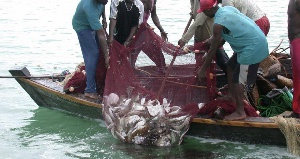A Natural Resources Economist says Ghana will need more political will to address issues of over fishing and depleting of stock catches in the country's waters.
He noted that due to climate change, tropical fish stock catches have reduced to over 40 per cent and the issue of over fishing as a result of illegal use of fishing gears continue to be a challenge in the sector.
Professor Wisdom Akpalu, Director of Environment and Natural Resources Research Initiative (ENRRI) and Dean of School of Research and Graduate Studies, Ghana Institute of Management and Public Administration (GIMPA) said this in a day's seminar in Accra on the theme:" Managing Capture Fisheries in Ghana: Challenge and Opportunities. "
It brought together key decision makers and actors in the fishery sector.
Prof.Akpalu noted that artisinal fishermen may not get anything in their nets " if we continue to do the things that we are doing now."
He called for a reduction in the number of canoes from 12,728 to 9,000 noting that each canoe should also be licensed.
"There are too many canoes than we need. We need to reduce them in order to obtain the maximum sustainable support yield as well as ensure profitability in the fishing sector. Tuna Vessels should be reduced to 50."
According to him, if canoes and trawlers were reduced 38,890 fisher folks would be affected and government could raise more revenue from the remaining canoes and trawlers and find alternative jobs for the affected persons.
He opined that Ghana stands at obtained $ 371 million annually as against $169 million in the fishing sector should the number of vessels and trawlers be reduced.
He noted that fines imposed of trawlers should not be disturbed by political actors and all breaches of offences should be treated as crimes.
"In Ghana we find out that Trawlers that breached the law and are fined, do not pay the specified fines. If people breach fishing laws and they pay less, people would continue to indulge in more crimes.
“We should allow institutions to carry out their mandate as stated by law."
Prof Akpalu called for the fixing of video devices on trawlers to check their activities of fishing to ensure transparency.
According to him, fixing of the video devices were adopted in Chile and same was used in monitoring vessels from afar.
Prof Akpalu noted that Trawler catch per vessel which was 3,000 tonnes in the 1970's had reduced to 500 tonnes by 2016 and could adopt Chile's best practices by enhancing the Vessel Monitoring Systems currently used by Ghana to sustain the fishing industry.
During discussions on Professor Akpalu's research, participants called for the elimination of illegal use of fishing gears such as the use of small meshed nets and addressing the challenge of light fishing.
They also called for digitization of data on fishing to help policy makers in decision making.
In Ghana, fishing industry is estimated to have employed 2.5 million fishermen and 500,000 women and constitute about four per cent annually to Ghana's economy total Gross Domestic Product (GDP).
Health News of Wednesday, 19 August 2020
Source: GNA

















